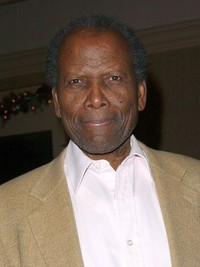Sidney Poitier

As elegant and quietly commanding a personality as ever graced motion pictures, Sidney Poitier came to the fore of American culture in the 1950s and 1960s as a fine actor, and as an ambassador of America's long-delayed civil rights movement. While other actors and actresses of color made impact before and after him, Poitier in his time leveraged his mesmerizing screen presence into a culture-changing force. His very first film set off a chain of events that freed his native Bahamas of British colonial rule, and from there he not only became the first black Best Actor Oscar winner - for "Lilies of the Field" (1963) - but was the number-one box-office draw in 1967 in a triumvirate of movies: "In the Heat of the Night" (1967), "To Sir, with Love" (1967) and "Guess Who's Coming to Dinner?" (1967). The regal Poitier's influence as an admirable role model of any color could not be underestimated. As he phased himself out of entertainment, his worldwide prestige would allow his native Bahamas to call on him to take on the new role of diplomat and representative to the United Nations. Simply put, Sidney Poitier became a beloved national treasure and symbol of a struggle almost as old as the United States itself.